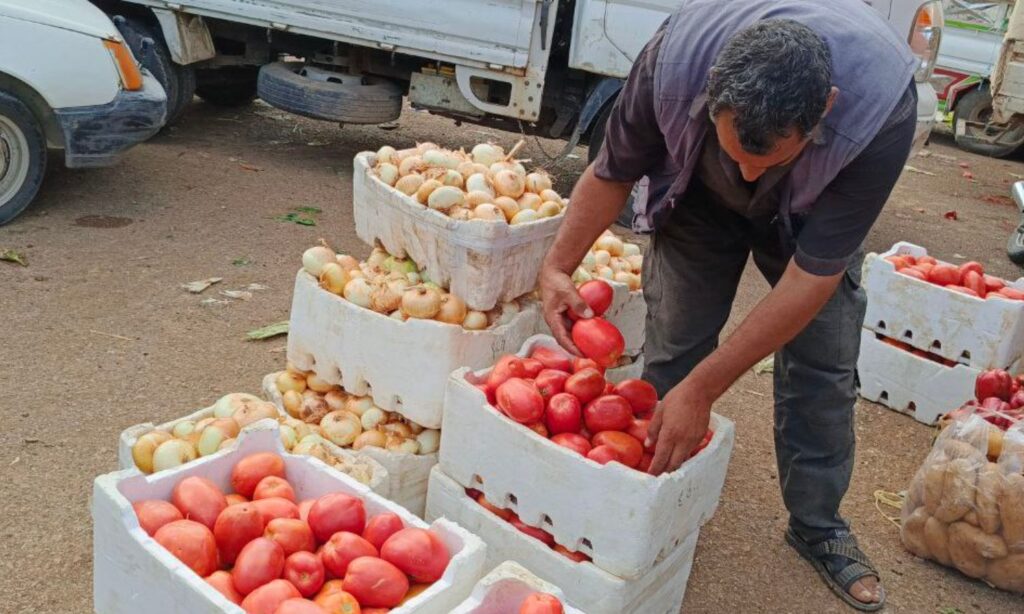Tomato prices in the al-Hal markets of Daraa governorate, southern Syria, have doubled compared to their prices at the beginning of this month, due to increased demand from canneries and exports.
Canneries purchase the second-grade tomatoes, while first-grade tomatoes are exported after being prepared in processing workshops.
Daraa governorate is a primary source of tomatoes, supplying markets in other governorates, primarily Damascus.
Today, the price of a kilogram of tomatoes in Daraa reached 3,000 Syrian pounds (20 US cents), while it did not exceed 1,500 pounds at the beginning of this month (10 cents).
According to the S-P Today website, which specializes in the exchange rates of the Syrian pound against foreign currencies, the exchange rate of the Syrian pound against the dollar amounts to 14,800 pounds equivalent to 1 dollar.
Canneries attract production
Amjad (40 years old), a merchant in the al-Hal market of Tafas city, western Daraa, told Enab Baladi that the market is almost devoid of tomatoes because farmers prefer selling their crops to canneries for financial reasons.
The factory owner provides the farmer with boxes to pack the tomatoes, saving the farmer the cost of buying foam boxes used for packing agricultural crops, as the price of one foam box is 8,000 pounds (54 cents), according to the merchant.
Moreover, the factory owner pays the transportation fees of the crop from the farmer’s field to his factory.
Transportation costs represent a significant part of the cost of harvesting and transporting the crop to market due to the high price of diesel fuel, not less than 400,000 pounds (27 dollars), varying based on the distance from the farm to the al-Hal markets.
Farmer Mohammad, who has 15 dunums planted with tomatoes in western Daraa, used to deliver his production to the al-Hal market in Tafas city at the beginning of this month, but since mid-month, he has contracted with a cannery, and his produce now goes directly to the factory.
Mohammad told Enab Baladi that he saved the commission paid to the al-Hal market, in addition to the transportation fees and packing boxes.
There are 40 canneries in Daraa governorate, each accommodating 2,000 tons, meaning the total amount expected to be processed by the canneries is 80,000 tons, according to a statement by Daraa’s Director of Industry, Imad al-Rifai, to the government Tishreen newspaper on July 17, 2024.
Al-Rifai explained that the production of canneries has seen demand in the local market in Daraa and other governorates and has become a competitive commodity in foreign markets, especially since some factories have export contracts that they are currently working to fulfill before the end of the season.
The area planted with tomatoes in Daraa reaches 40,000 dunums, according to Daraa Chamber of Agriculture Director, Qassem al-Masalmeh, in his interview with Tishreen newspaper on June 27, 2024.
Each dunum produces 10 tons, thus the estimated production of tomatoes in the governorate this year is approximately 400,000 tons.
Export is an important factor
Several workshops in the Daraa countryside buy tomatoes from the market or contract directly with farmers.
These workshops pack the tomatoes in small plastic containers and ship them to Gulf countries through the Nassib border crossing with Jordan.
Merchant Wael (40 years old) exported a refrigerated truck loaded with tomatoes to Oman in mid-July.
Wael complained about the bureaucratic delays at the Jaber border crossing, which poses a risk to the tomatoes since semi-ripe tomatoes (beginning of the ripening stage before turning red) are preferred in the Gulf market, and delays in arrival of more than ten days lead to full ripening, which exposes the merchant to the risk of rejection of the shipment.
Delays increase the merchant’s losses as continuous refrigeration is necessary, requiring additional quantities of diesel, not to mention increased transportation costs in case of delays, according to Wael.
Mohammad al-Aqad, a member of the Fruit Traders and Exporters Committee in Damascus, estimated the number of trucks crossing the Jordanian border daily at between 25 and 30 trucks.
In a statement to the local Al-Watan newspaper, al-Aqad mentioned that Syrian trucks wait at the Jordanian border for 8 to 10 days before being allowed entry, causing damage and spoilage of the crops.
Syrian exports have decreased, according to al-Aqad, compared to last year, due to Jordanian measures aimed at facilitating the entry of Jordanian products into the Gulf market as an alternative to Syrian products, as reported by Al-Watan newspaper.
Enab Baladi’s correspondent in Daraa, Halim Muhammad, contributed to this report.

